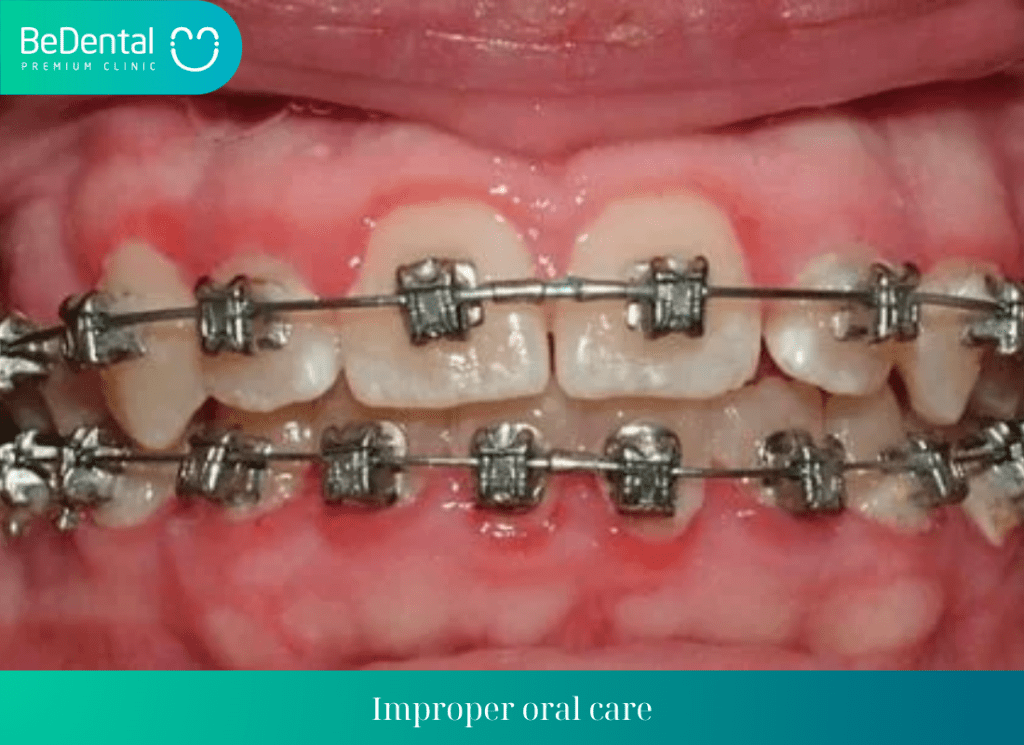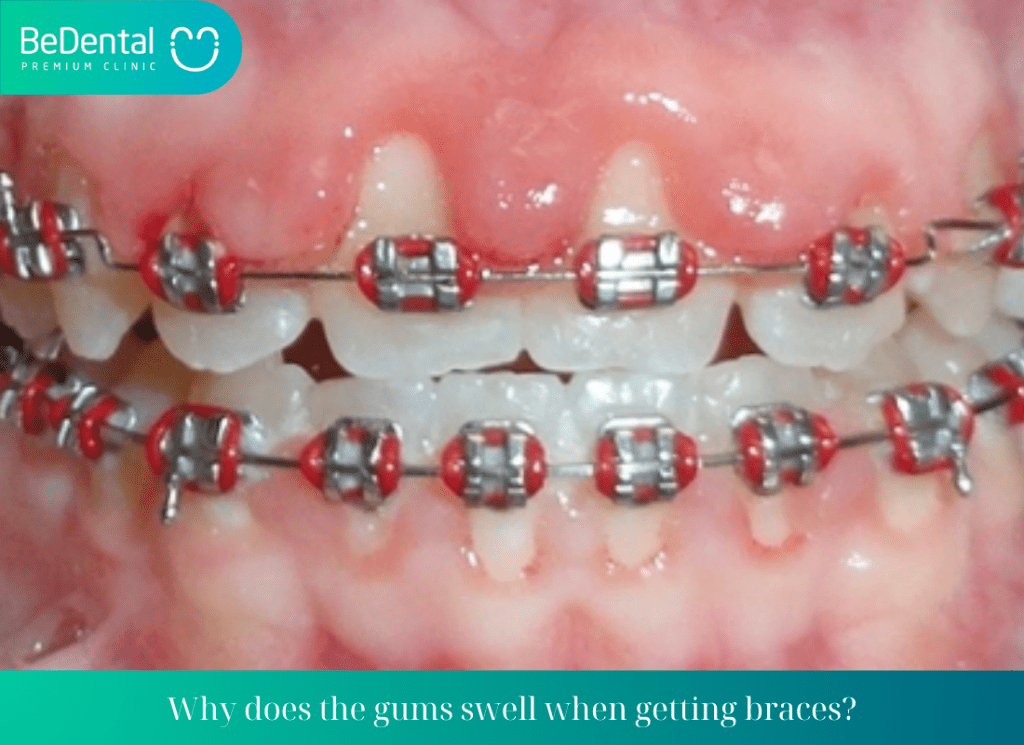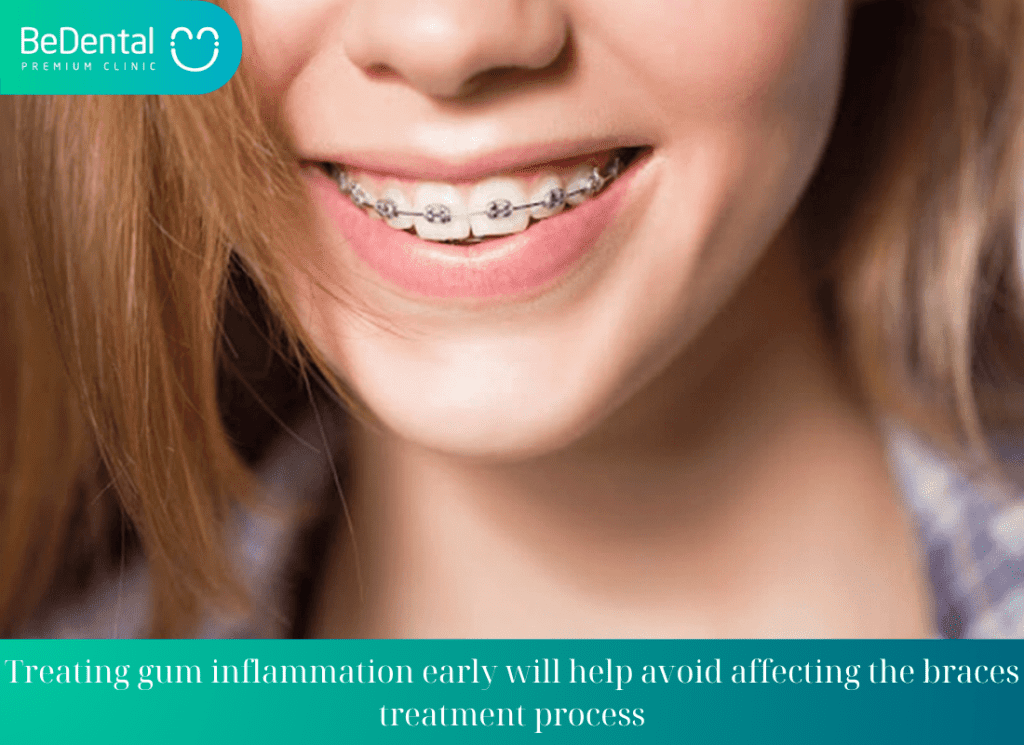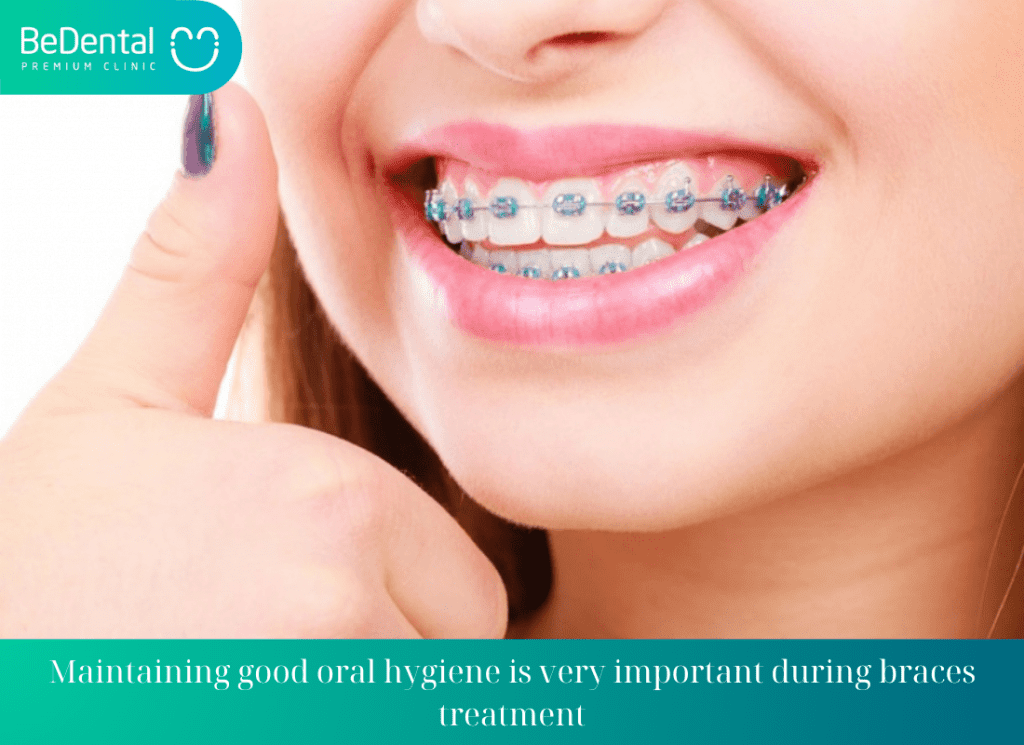During the process of getting braces, patients often encounter many oral health issues. One of the most common issues is swollen gums caused by braces, leading to discomfort and pain. This condition not only affects daily comfort but can also disrupt the effectiveness of the braces process. So why does the gums swell when getting braces, and what solutions do we have to overcome it? Let’s follow the article below to learn in detail about this issue and the necessary measures to maintain oral health during the braces process!
Why does the gums swell when getting braces?
Why does the gums swell when getting braces? Swollen gums and inflammation are fairly common conditions that many patients experience during orthodontic treatment. Initially, this condition may not cause discomfort or serious health effects. However, if not treated promptly, it can progress and lead to dangerous complications.
See more: Braces or Ceramic Veneers: Pros and Cons
There are several reasons that lead to swollen gums and inflammation during the braces process, and here are the main causes you should pay attention to:
Improper oral care
During braces treatment, patients have to use brackets, wires, and rubber bands. These devices can make food easier to get stuck, making oral hygiene more difficult.
When food particles are not thoroughly cleaned, they will accumulate and form plaque. This plaque creates an ideal environment for bacteria to grow, leading to various oral health issues, including gum inflammation.

Failure to maintain proper oral hygiene during braces treatment can make swollen gums more severe, causing pain and discomfort for the patient.
Therefore, understanding the causes and implementing proper care measures is crucial to protect oral health during the braces process.
Incorrect brushing techniques
This is a common cause of gum damage. Brushing too hard or using a brush that is too hard can cause the gums to be scratched and bleed. This creates conditions for bacteria to easily invade the damaged areas, leading to gum inflammation. Choosing a soft brush and brushing gently is very important to protect gum health.
See more: What Is the Appropriate Age for Braces?
Unscientific diet
During braces treatment, many people often have difficulty eating due to pain from teeth tightening or discomfort from wearing appliances. This can reduce appetite and lead to an inadequate nutritional intake.
Lack of vitamin C and calcium in the diet is a major cause of gum inflammation during braces treatment. A balanced diet, including foods rich in vitamins and minerals, will help maintain gum health and reduce the risk of inflammation.
Incorrect orthodontic treatment
Not all doctors have the level of skill and experience to safely and effectively perform orthodontic treatment. If a patient encounters a poorly skilled doctor, careless work, or excessive teeth tightening, they may experience gum inflammation. Furthermore, errors in orthodontic techniques can lead to more dangerous complications such as bone resorption, root resorption, and even tooth loss.
Therefore, choosing a professional and experienced doctor is extremely important to ensure a smooth and safe braces process.
See more: What is Orthodontic archwire?
Gums swell when getting braces, is it serious?
When gums swell and become inflamed during braces treatment, if not corrected promptly, patients may face many serious consequences. Below are the harmful effects that this condition can cause:

- Development into Periodontitis: If not treated promptly and thoroughly, gum inflammation can develop into periodontitis. This is a serious condition that damages the tooth structure, causes gum recession, and exposes the tooth roots. When the tooth structure is severely damaged, the treatment process becomes complicated and much more costly.
- Risk of Jaw Resorption: Another dangerous complication of swollen gums during braces treatment is jaw resorption. When the jawbone resorbs, the teeth gradually weaken, become loose, and are at risk of breaking or falling out at any time. This condition not only leads to the failure of the braces treatment but also requires a lot of time and expenses to address the arising complications.
See more: Signs of gum recession during braces
- Difficulty in Eating: Painful and inflamed gums make eating more difficult. Especially when consuming hot or cold foods, teeth become extremely sensitive. Poor appetite not only affects overall health but also makes the body easily fatigued and decreases morale.
- Bad Breath: Bacteria that accumulate and thrive in the mouth cavity when gums are inflamed can cause unpleasant bad breath. This not only affects oral health but also hinders daily communication activities. Patients may become hesitant and self-conscious when smiling or talking to others.
Therefore, when experiencing gums swell when getting braces, patients should promptly seek appropriate treatment to avoid serious consequences in the future.
Treatment for gums swell when getting braces
What is the treatment for gums swell when getting braces? When facing gums swell when getting braces, patients should quickly visit a dentist for examination and receive timely treatment. Treating gum inflammation early will help avoid affecting the braces treatment process and maintain good oral health.
In cases of mild gum inflammation, the dentist will clean plaque on the tooth surface and gum line to remove disease-causing bacteria.
This cleaning process involves deep cleaning, removing plaque and tartar buildup around the tooth roots and gums. This cleaning not only helps reduce inflammation but also prevents the growth of harmful bacteria.
See more: What is Abutment?
Depending on the severity of inflammation, the dentist may prescribe anti-inflammatory medication to treat gum inflammation effectively.
Anti-inflammatory medications, such as antibiotics or anti-inflammatory gels, will be used to reduce swelling and pain, helping the gums to recover quickly. Patients need to follow the dentist’s instructions on medication use and daily oral care to achieve the best treatment results.

In addition, maintaining good oral hygiene is very important to prevent gums swell when getting braces. Patients should brush their teeth at least twice a day with a soft brush, use dental floss to clean between teeth, and use antibacterial mouthwash to eliminate bacteria. Regular check-ups at the dentist also help the dentist monitor and prevent gum issues in a timely manner.
When gum inflammation becomes severe, leading to gum recession and exposed tooth roots, gum grafting is necessary to ensure oral health and aesthetics. In this case, the dentist will need to adjust and reduce the pressure on the teeth to treat gum inflammation effectively.
See more: Dental implants
Only when oral health is fully restored can the process of tightening and wearing braces continue. Continuing to tighten braces when the gums are damaged can lead to serious complications, including the risk of tooth loss due to the gums no longer securely holding onto the teeth.
To prevent gum inflammation during braces treatment, patients need to pay attention to ensuring proper nutrition and oral hygiene from the beginning. Proper brushing, flossing, and the use of antibacterial mouthwash will help limit harmful bacteria and plaque buildup.

Additionally, choosing a reputable dental clinic and a skilled dentist will help minimize many risks during the braces treatment and gum inflammation treatment. Regular check-ups and following the dentist’s instructions are also crucial to ensure that the braces treatment progresses smoothly and achieves the best results.
The issue of swollen gums during braces treatment is a problem that can be completely resolved without causing long-term damage by consulting a professional dentist and maintaining a healthy and scientific diet.
See more: Do braces cause toothloss?
Preventing and managing gums swell when getting braces
Preventing and managing gums swell when getting braces is crucial for maintaining oral health and ensuring the success of orthodontic treatment. When undergoing braces treatment, the pressure and friction exerted on the gums and teeth can lead to inflammation if proper care is not taken.
Recognizing early signs of gum inflammation, such as redness, swelling, and tenderness, is key to addressing the issue promptly. Implementing effective prevention strategies, including regular brushing and flossing, using interdental brushes, and incorporating antimicrobial mouthwash, can help reduce the buildup of plaque and bacteria around the braces.
Seeking timely treatment from dental professionals, such as deep cleanings or prescription medications, and following their guidance on oral care routines are essential components of managing gum inflammation.
Establishing a long-term management plan that focuses on sustaining good oral hygiene habits post-braces treatment is vital in preserving gum health and preventing future complications.
By proactively addressing gum inflammation and maintaining a collaborative relationship with dental professionals, patients can experience a smoother orthodontic journey with improved oral health outcomes.
See more: Things to know when wearing braces
Conclusion
In conclusion, gums swell when getting braces can lead to serious complications if not addressed promptly and effectively. Gum inflammation can progress to periodontitis, jaw resorption, eating difficulties, bad breath, and other oral health issues, jeopardizing the success of the braces treatment and overall well-being.
It is essential for patients to prioritize oral hygiene, seek timely treatment from reputable dental professionals, and follow their guidance to prevent and manage gum inflammation effectively.
By maintaining good oral health practices, choosing a skilled dentist, and adopting a healthy diet, patients can minimize risks and ensure a smoother braces treatment process with optimal results.
Tư vấn chuyên môn bài viết:
BÁC SĨ DƯƠNG THỊ THÙY NGA





